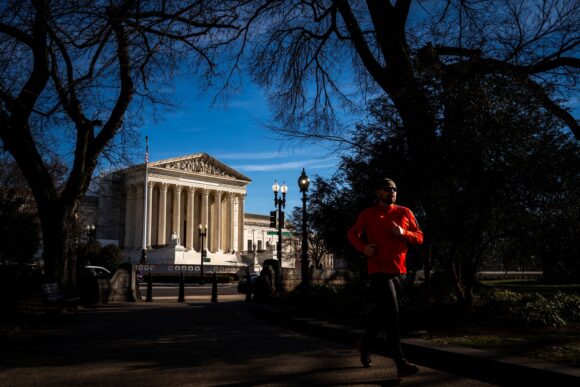A divided US Supreme Court refused to question an admissions policy at a competitive Virginia public high school, turning away contentions that the program was designed to reduce the percentage of Asian-American students.
The rebuff is a blow to racial-preference opponents who had sought to extend the 2023 Supreme Court decision that barred universities from using race in admissions for the sake of diversity.
Related: Supreme Court Rejects Use of Race in University Admissions
The rejection drew a sharply worded dissent from Justices Samuel Alito and Clarence Thomas, who blasted a federal appeals court decision that upheld the policy. Alito said that ruling allowed intentional racial discrimination “so long as it is not too severe.”
The lower court’s reasoning “is indefensible, and it cries out for correction,” Alito wrote.
As is customary, the court as a whole gave no explanation for the order, which rejected an appeal from parents and students who sued to challenge the policy.
Last year’s Supreme Court ruling, which struck down affirmative action programs at Harvard College and the University of North Carolina, left open questions about policies that don’t explicitly consider race but nonetheless affect the racial composition of a school.
Diversity Sought
The Fairfax County School Board said the admissions policy it adopted in 2020 for Thomas Jefferson High School for Science and Technology was designed to get more geographic and socio-economic diversity. Under an earlier system, an overwhelming majority of students came from eight of the county’s 26 middle schools, the county said.
The 4th US Circuit Court of Appeals upheld the policy in May on a 2-1 vote.
“The challenged admissions policy’s central aim is to equalize opportunity for those students hoping to attend one of the nation’s best public schools, and to foster diversity of all stripes among TJ’s student body,” Judge Robert Bruce King wrote for the majority.
The 4th Circuit issued its decision several weeks before the Supreme Court ruled in the Harvard and North Carolina cases. The timing meant the high court had the option of ordering the 4th Circuit to reconsider the Thomas Jefferson case in light of the university ruling, but the justices instead rejected the appeal and effectively ended the lawsuit.
The parents and students challenging the new policy said the share of Asian-American in the admitted class plunged from 73% in 2020 to 54% in 2021. The number of admitted Asian-American students fell even though the county increased the size of the entering class, the challengers said.
The new policy did away with longstanding admissions tests, replacing them with a process that guarantees a certain number of seats to each of the county’s middle schools and give applicants extra points for socio-economic factors including eligibility for free meals and status as English-language learners.
The Supreme Court case is Coalition for TJ v. Fairfax County School Board, 23-170.
Photo: The US Supreme Court in Washington, DC. Bloomberg.
Topics K-12
Was this article valuable?
Here are more articles you may enjoy.



 Florida’s Commercial Clearinghouse Bill Stirring Up Concerns for Brokers, Regulators
Florida’s Commercial Clearinghouse Bill Stirring Up Concerns for Brokers, Regulators  Nine-Month 2025 Results Show P/C Underwriting Gain Skyrocketed
Nine-Month 2025 Results Show P/C Underwriting Gain Skyrocketed  Maine Plane Crash Victims Worked for Luxury Travel Startup Led by Texas Lawyer
Maine Plane Crash Victims Worked for Luxury Travel Startup Led by Texas Lawyer  Trapped Tesla Driver’s 911 Call: ‘It’s on Fire. Help Please’
Trapped Tesla Driver’s 911 Call: ‘It’s on Fire. Help Please’ 

